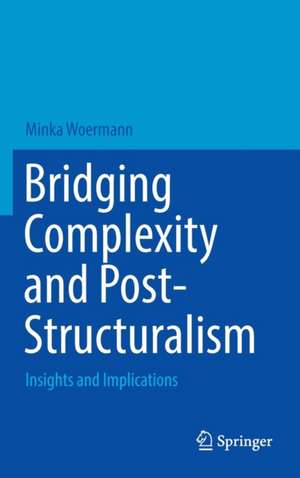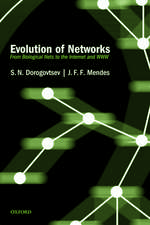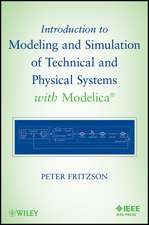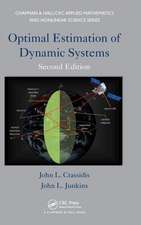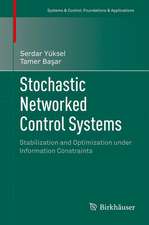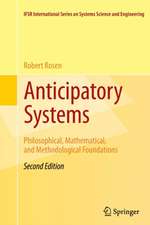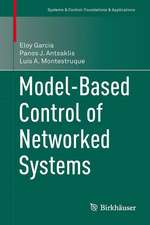Bridging Complexity and Post-Structuralism: Insights and Implications
Autor Minka Woermannen Limba Engleză Hardback – 7 oct 2016
This work addresses the topic of philosophical complexity, which shares certain assumptions with scientific complexity, cybernetics, and General Systems Theory, but which is also developing as a subject field in its own right.
Specifically, the post-structural reading of philosophical complexity that was pioneered by Paul Cilliers is further developed in this study. To this end, the ideas of a number of contemporary French post-structural theorists and their predecessors - including Derrida, Nancy, Bataille, Levinas, Foucault, Saussure, Nietzsche, Heidegger, and Hegel - are introduced. The implications that their various insights hold for our understanding of complex human systems are teased out at the hand of the themes of economy, (social) ontology, subjectivity, epistemology, and ethics. The analyses are also illuminated at the hand of the problematic of the foreigner and the related challenges of showing hospitality to foreigners.
The study presents a sophisticated account of both philosophical complexity and philosophies of difference. By relating these subject fields, the study also extends our understanding of philosophical complexity, and offers an original characterisation of the aforementioned philosophers as complex thinkers.
| Toate formatele și edițiile | Preț | Express |
|---|---|---|
| Paperback (1) | 383.71 lei 43-57 zile | |
| Springer International Publishing – 27 iun 2018 | 383.71 lei 43-57 zile | |
| Hardback (1) | 391.02 lei 43-57 zile | |
| Springer International Publishing – 7 oct 2016 | 391.02 lei 43-57 zile |
Preț: 391.02 lei
Nou
Puncte Express: 587
Preț estimativ în valută:
74.82€ • 78.32$ • 62.28£
74.82€ • 78.32$ • 62.28£
Carte tipărită la comandă
Livrare economică 31 martie-14 aprilie
Preluare comenzi: 021 569.72.76
Specificații
ISBN-13: 9783319390451
ISBN-10: 3319390457
Pagini: 200
Ilustrații: XI, 205 p. 3 illus., 2 illus. in color.
Dimensiuni: 155 x 235 x 14 mm
Greutate: 0.49 kg
Ediția:1st ed. 2016
Editura: Springer International Publishing
Colecția Springer
Locul publicării:Cham, Switzerland
ISBN-10: 3319390457
Pagini: 200
Ilustrații: XI, 205 p. 3 illus., 2 illus. in color.
Dimensiuni: 155 x 235 x 14 mm
Greutate: 0.49 kg
Ediția:1st ed. 2016
Editura: Springer International Publishing
Colecția Springer
Locul publicării:Cham, Switzerland
Cuprins
From the Contents: A philosophical approach to complexity.- Complexity and her roots.- Scientific v. philosophical complexity.- Principles of philosophical complexity.- Philosophical complexity and the status of ontology, epistemology, and ethics.- Philosophical complexity and the question of ethics.- The ethics of complexity and the complexity of ethics.
Recenzii
“This book is also a valuable introduction to contemporary French philosophy. The clear unfolding of the ideas of rather ‘complex’ thinkers will please students, while the challenging argumentation will certainly entice scholars that are looking for new paths in philosophy. Even scientists … might benefit from this study.” (Erik Meganck, Tijdschrift voor Filosofie, Vol. 79, 2017)
Textul de pe ultima copertă
This work addresses the topic of philosophical complexity, which shares certain assumptions with scientific complexity, cybernetics, and General Systems Theory, but which is also developing as a subject field in its own right.
Specifically, the post-structural reading of philosophical complexity that was pioneered by Paul Cilliers is further developed in this study. To this end, the ideas of a number of contemporary French post-structural theorists and their predecessors - including Derrida, Nancy, Bataille, Levinas, Foucault, Saussure, Nietzsche, Heidegger, and Hegel - are introduced. The implications that their various insights hold for our understanding of complex human systems are teased out at the hand of the themes of economy, (social) ontology, subjectivity, epistemology, and ethics. The analyses are also illuminated at the hand of the problematic of the foreigner and the related challenges of showing hospitality to foreigners.
The study presents a sophisticated account of both philosophical complexity and philosophies of difference. By relating these subject fields, the study also extends our understanding of philosophical complexity, and offers an original characterisation of the aforementioned philosophers as complex thinkers.
Caracteristici
Includes an excellent introduction to philosophical complexity Introduces the reader to poignant post-structural philosophical insights Develops the field of philosophical complexity
